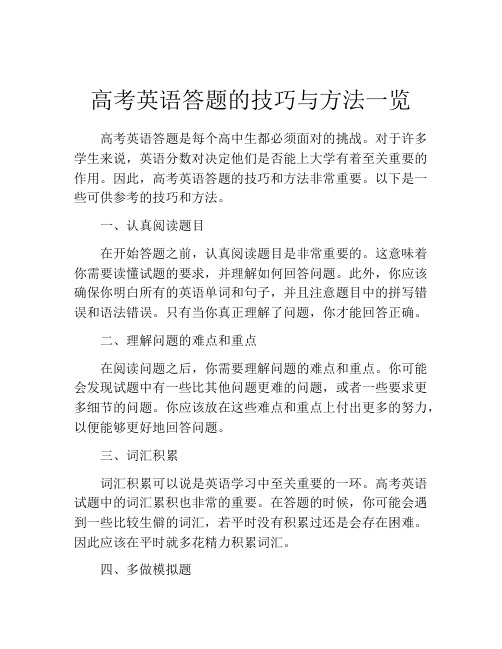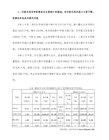高考英语新题型应对技巧
- 格式:doc
- 大小:29.50 KB
- 文档页数:3

高考英语答题的技巧与方法一览高考英语答题是每个高中生都必须面对的挑战。
对于许多学生来说,英语分数对决定他们是否能上大学有着至关重要的作用。
因此,高考英语答题的技巧和方法非常重要。
以下是一些可供参考的技巧和方法。
一、认真阅读题目在开始答题之前,认真阅读题目是非常重要的。
这意味着你需要读懂试题的要求,并理解如何回答问题。
此外,你应该确保你明白所有的英语单词和句子,并且注意题目中的拼写错误和语法错误。
只有当你真正理解了问题,你才能回答正确。
二、理解问题的难点和重点在阅读问题之后,你需要理解问题的难点和重点。
你可能会发现试题中有一些比其他问题更难的问题,或者一些要求更多细节的问题。
你应该放在这些难点和重点上付出更多的努力,以便能够更好地回答问题。
三、词汇积累词汇积累可以说是英语学习中至关重要的一环。
高考英语试题中的词汇累积也非常的重要。
在答题的时候,你可能会遇到一些比较生僻的词汇,若平时没有积累过还是会存在困难。
因此应该在平时就多花精力积累词汇。
四、多做模拟题准备充分的模拟考试可以大大提高你在高考英语中的分数。
模拟考试会让你在真实的考试环境中体验到答题的感觉,并帮助你磨练在短时间内作出正确的选择的能力。
五、高效利用时间在答题时请合理安排时间,抓住时间的纪律是高效的关键。
在答题过程中不要耽误过多时间在某道题上,如果不会的话也赶紧跳过,争取在剩下的时间里回答更多的题目。
六、推断答案正确推断答案也是高考英语答题的重要技巧之一。
一些试题需要学生有着自己独立的思考和推断,因此需要掌握推断能力。
通过推理来确定获取正确答案的可能性会变得更大。
七、认真抄题考生一定要认真抄题,避免出现在填涂卡时填错题号的情况,认真仔细抄题,慢一点儿也没关系,不能因为抄题时的马虎导致浪费了答案。
以上是我总结的一些关于高考英语答题技巧和方法。
如果你能够恰当地应用上述技巧和方法,相信你的高考英语成功机会会比较大。
当然了,在熟练掌握了基础知识和技能之后也要保持心态平和不灰心丧气,心态有了保障,就算遇到错题也可以很快恢复过来。

高考英语题做题技巧高中阶段,英语是考生必须掌握的科目之一。
因此,参加高考的学生,对于英语题目的做题技巧掌握非常关键。
以下是一些高考英语题目做题技巧,供考生参考。
一、阅读理解题目做题技巧1.通读全文再做题在做阅读理解的第一步,要将整篇文章通读一遍,以便更好地理解文章信息和框架。
这样,能够帮助考生更好地理解文章的主旨和作者的意图,并从文章中获取正确的答案。
2.了解关键词在具体做题之前,一定要先了解关键词,这样可以更快地定位到答案。
例如,一篇文章讲述了关于一种产品的信息,而问题是要求我们说出产品的价格。
在看到价格时,就可以快速定位到与之相关的信息,从而更快地找到正确答案。
3.注意答案的表述在答题之前,考生要仔细阅读答案,特别注意题目中的疑问词,例如“who”、“what”、“when”、“where”、“why”、“how”,因为这些问题的答案通常需要特别的注意,而且要准确无误。
二、完型填空题目做题技巧1.首先熟悉文章在开始做完型填空题目之前,应该仔细阅读文章,并尝试找到文章的主旨思想和结构。
这样,可以更好地帮助考生找到正确的答案。
2.填写通才在填空时,可以先填写那些通才词汇,如“a”、“an”、“the”、“that”、“which”、“and”、“so”、“but”等,这样能够占据一定的空间,帮助知道空格的位置,也有利于进一步定位正确的答案。
3.注意词性和语法在进行填空时,要特别注意所填单词的词性和语法。
特别是在词性和语法方面容易出错的地方,要进行标注,帮助自己更好地把握整体上下文的语言含义,避免出现错误答案的情况。
三、语法填空题目做题技巧1.找出动词的人称和末尾的时态在做语法填空题目时,首先需要注意的是动词的人称和时态,因为通常会影响到答案的正确性。
在填空的过程中,要注意动词语态,大多数情况下应使用被动语态。
2.注意句子结构在进行语法填空时,需要注意整个句子的结构,尤其是句子中的主谓关系。
因为很多时候,句子结构的变化会产生不同的词汇形式,这也会对答案产生影响。



高考英语答题技巧一、阅读理解:注要考察考生对主旨和要义的理解,明确短文的意图、观点和态度的能力。
●考查对文章中心思想的把握能力。
●考查句意理解的精确度。
●抓住关键句,每段的首句大抵是本段的关键句。
●常考:主旨大意型、事实细节型、词义猜测型、推理判断型二、七选五:●从答案出发,再到文章。
●通常为议论文,着眼每个小标题。
小标题就可以决定选项。
●一定要既能承上,又能启下,才是最佳答案。
●关键词很重要,但也可能是陷阱。
三、完形填空:●先纵观全文大意;●选择答案,如果遇上不会的单词,从你会的单词去排除;●通常高考英语的完形填空不存在词性的选择,选项的词性基本保持一致的。
四、语法填空:●无单词的情况下,你考虑:介词(+doing sth),引导词(+句子),并列词(句子前后可能是转折或者并列),冠词(+adj+n),情态动词+do,固定搭配;●有单词的情况下:基本搭配,形容词变副词(大多数情况下是?ly),非谓语动词(主要是doing,done,to do),比较级,单数变复数……五、应用写作●注意应用文体格式,称呼。
●注意内容目的。
是感谢信、还是参加会议等。
●注意要表达的事件、时间、地点等要素。
六、书面表达:●审题要细、定位要准。
通读试题的每一个字,观察所给的每一幅画,从而明确作文的中心思想,判断作文类型、特点,了解作文的重点内容,力求写作切中题意。
●圈要点。
重读试题,在原题的汉语提纲或图表上圈画要点,即“给分点”,又称“扣分点”。
若提供的是图画,也可在每幅画旁用简单的词语标示出它所表达的要点。
这样做既可提醒自己不要漏写了要点,又能防止过分发挥,尤其是看图作文,避免本末倒置的错误。
●注短语。
在圈画的要点旁边批注相应的英语表达法,为将来全文的写成作好准备。
●定基调。
通过分析思考,给文章的四个基本特点定调。
时态、语态。
人称、口吻。
顺序、段落。
开头、结尾。
●写全文。
套用句型, 多用短语。
尽量套用已学句型可避免汉语式的英语,多用短语有利于避免语法错误。

高考英语所有题型解题技巧全攻略一.听力应试技巧与策略听前:略读题目,切入话题,划出重点,预测内容(确定人物身份)听中:捕捉信息,速记要点,有的放矢,去伪存真(短文独白,首末为主旨句,注意5W,1H)【when,where,what/which,who,why,how】听后:连贯记忆,前后联系,综合考虑,一锤定音。
二.快速记录能力心记:这种能力对于解决听力第1节的问题非常适用。
笔记:1)运用速记符号例如:↑up↓down←left→right=equal2)发明并运用字母的缩写形式Ex——expensive lg——large eq——earthquake三.预测技巧1.对话预测:在听取对话,尤其是Part1-5——Short Conversation时,考生可以按照下例wh-问题进行预测:1)Who are the two speakers?2)What is the possible Relationships between them?3)When did they have the conversation?4)Where did the conversation take place?5)Why do they have the conversation?6)What did they plan to do?2.语篇预测:了解讲话者已提供和未提供的信息1)What facts did the speaker offer?2)What facts did the speaker fail to offer?3.依靠开篇句预测:英语听力的第一句话通常会透露整篇的主题,所以大家要善于抓住听力材料的首句信息。
例如:Americans have a popular saying “Time is money。
”从这一句开篇句我们可以预测的信息范围:1)这是一篇关于时间的话题。
2)涉及对象是美国人。
高考英语新题型破题技巧新改错顺口溜短文改错很简朴,名词动词两主线。
每句话为一单位,错误位于每行间。
名词可数不可数,形式是复还是单。
动词及物不及物,有无名词在后面。
何种时态弄清晰,主动被动要判定。
非谓动词何形式,做何成分是要害。
冠词用冠不用冠,定冠还是不定冠。
形容副词互扰乱,从句连词是重点。
碰到and 需判断,到底并列还是转/选。
并列and 不改变,若转but来更换。
介词副词接短语,习惯用法按习惯。
前后文章要连贯,做完前后审一遍。
没错就把对号添。
新改错例题1假定英语课上老师要求同桌之间交换修改作文,请你修改你同桌写的以下作文。
文****有10处语言错误,每句中最多有两处。
错误涉及一个单词的增加、删除或修改。
增加:在缺词处加一个漏字符号(^),并在其下面写出该加的词。
删除:把多余的词用斜线(\)划掉。
修改:在错的词下划一横线,并在该词下面写出修改后的词。
注重:1.每处错误及其修改均仅限一词;2.只答应修改10处,多者(从第11处起)不计分。
Last Sunday I saw a worst storm in years. It came sudden and went on for over three hours. After lunch I went into my room to have a rest. The air was hotter and all is quiet. Then a strong wind started to blow into my room. Pieces of paper on my desk flew high into the air and some flew out the open window. As I ran out to catch them big drop of rain began to fall. When I came back into house it was raining harder and harder. I tried very hard to close the window. Then I heard a loudly crashing(碰撞的)sound from the back of the house. When I ran out to find that a big tree had fallen down and broke the top of the back room.解题思路(三步解题法):第一步:快速浏览全文,掌握文章的主要时态、人称及文章的主旨大意,顺便标记自己一眼就能看出的错误。
高考英语做题技巧和方法一、阅读理解阅读理解是高考英语中非常重要的一部分,也是分数占比最大的部分。
要想在阅读理解中获得高分,需要掌握以下几个技巧:1. 快速浏览全文,了解文章大意和结构。
在阅读时,要注意文章的主旨、段落大意以及作者的观点和态度等信息,以便更好地理解文章内容。
2. 仔细阅读题目,明确题目要求。
在阅读题目时,要特别注意题目的关键词和细节信息,以便在文章中快速定位答案。
3. 根据题目的要求,在文章中找出相关的句子或段落,并仔细阅读。
在阅读相关内容时,要注意理解作者的意图和言外之意,以便更好地回答题目。
4. 遇到生词时,要根据上下文和语境猜测其含义。
如果实在猜不出来,可以暂时跳过,等完成其他题目后再回来解决。
5. 做选择题时,要仔细分析每个选项的含义和逻辑关系,排除与文章内容不符或表述错误的选项,选出最符合题意的答案。
二、完形填空完形填空是高考英语中比较难的一部分,需要考生根据上下文语境和语法知识进行判断和选择。
要想在完形填空中获得高分,需要掌握以下几个技巧:— 1 —1. 快速浏览全文,了解文章大意和语境。
在阅读时,要注意上下文中的关键词和信息,以便更好地理解文章内容。
2. 分析每个空格的含义和语法结构,判断应该填入什么词。
在分析时,要注意词义、词性、时态、语态等方面的变化和搭配关系。
3. 根据句子的整体意义和逻辑关系,排除与空格无关或表述错误的选项,选出最符合题意的答案。
4. 对于难以判断的空格,可以暂时留空,等完成其他题目后再回来解决。
5. 在填空时,要注意考虑句子的语气和表达方式等方面的要求。
比如在选择连词时,要注意判断前后句的关系和衔接方式。
三、语法填空语法填空是高考英语中比较基础的一部分,主要考查学生的语法知识和语言运用能力。
要想在语法填空中获得高分,需要掌握以下几个技巧:1. 分析句子结构,确定填空类型。
常见的填空类型有动词时态、语态、非谓语动词等。
根据不同类型的填空要求,运用相应的语法知识进行解答。
高考英语新题型技巧1.总体先通读全文,掌握主旨大意,了解短文的体裁、题材、时态、内容、线索、写作意图、观点看法、段落大意、逻辑层次等。
在"总'读的过程中,可顺便填写某些空。
2.分项1.名词合计名词的可数与不可数,可数名词要合计使用单数还是复数。
2.动词要合计时态、语态、非谓语动词的正确使用以及主谓一致;3.代词要合计代词指代的一致性以及代词"格'的习惯用法;4.形容词、副词则要合计其基本用法(形容词修饰名词,代词以及在系动词后做表语;副词修饰动词,形容词,副词以及句子)和比较级;5.冠词要合计其基本用法和固定搭配;6.介词要合计与动词,形容词和名词的固定搭配;7.并列连词及状语从句的连词要合计词义本身及上下文的连贯穿顺,定语从句的关系词要合计其在从句中所做的成分,名词性从句的连词要合计词义本身和在从句中所做的成分。
2高考英语如何快速提分单词是做英语题的基础,高考词汇越早背完越好。
可以背单词书,但我推举用手机背单词软件,因为这样很便捷,吃饭排队等一些零散时间都可以背。
我用的扇贝单词,大概不到3个月背完了高考词汇。
语法题虽然分值比例不大,但错个两三道对得高分也是个不小的阻碍。
so......语法天天刷起来!一定要刷真题哦!(我是每三天刷一个五三上的语法专题)。
重点来了!错题一定要抄在错题本上!没事就看!考前也要看!刷两三遍真题语法肯定没问题!完型填空真的不难,单词背了,语法刷熟了,完形填空一定能做好啦!但是!!天天做1-2篇完型坚持题感、练速度、准确性不能偷懒哦~阅读的障碍其实是词汇,所以第一步的背单词很重要!天天3-4篇阅读真题,保持下去,一道不错不是梦!(碰到的生词一定要查!记在书上或笔记本上都可以,但一定要查!)七选五也是要练的!但是分析结构才是重点。
做完了一定要通读一遍!不要犯懒!高考作文其实是有捷径的!那就是背范文!真的,把你做的每套真题的范文都被一遍,不要求倒背如流。
高三英语新题型应对策略如今,高三英语考试中涌现了许多新题型,对学生的综合能力提出了更高的要求。
为了更好地应对这些新题型,学生需要采取一些应对策略。
本文将为大家介绍一些高三英语新题型应对策略,帮助学生在考试中取得更好的成绩。
一、阅读理解题应对策略对于阅读理解题,学生应该养成系统阅读的习惯。
在阅读文章前,可以先浏览题目,了解大意和问题类型,再进行阅读。
在阅读过程中,可以使用标记、划线等方式,将重要信息短暂记录下来,方便后续回答问题时查找答案。
同时,要注意文章结构和逻辑关系,把握作者的观点和意图,从而更好地回答问题。
二、完型填空题应对策略完型填空题考察学生的词汇积累和语言运用能力。
为了更好地应对这种题型,学生可以通过多读多练来提高自己的词汇量和语感。
平时可以多阅读英语文章、新闻、杂志等,同时注意积累生词。
在做题时,要通过上下文逻辑和常识推测出正确答案,并检查答案是否符合文章的整体意思和语境。
三、听力题应对策略听力题是考查学生听力理解和语音语调的能力。
为了更好地应对听力题,学生可以通过多听多练的方式进行提高。
可以听英语电影、听新闻、听英语广播等,培养自己对英语听力的敏感性和理解能力。
在做听力题时,要注意听清问题的关键词,并结合上下文语境,排除干扰选项,选择最符合问题的答案。
四、写作题应对策略写作题考查学生的写作能力和语言表达能力。
为了更好地应对写作题,学生可以通过多练习写作来提高自己的写作水平。
可以参考范文,分析写作结构和语言风格,并进行仿写练习。
同时,也要注重词汇积累和句型运用,灵活运用各种句式和表达方式,使文章更加准确、丰富。
要注意书写规范,语句通顺,避免语法错误和拼写错误。
五、翻译题应对策略翻译题考查学生的翻译能力和语言运用能力。
为了更好地应对翻译题,学生可以通过多阅读英文原文和中文翻译来提高自己的翻译水平。
可以选择一些经典的英文文章,进行逐句翻译和比对,找出差异和问题,并进行针对性的练习。
同时,也要注重词汇积累和语法运用,灵活运用各种翻译技巧,使翻译更加准确、通顺。
高考英语新题型应对技巧2014年高考英语考纲刚刚出炉,最大变化是英语学科,取消了单项选择题,代之为语篇型语法填空题,15分分值不变。
今年英语试卷仍由四部分组成:第一部分听力(30分,计入总分),第二部分阅读理解(包含阅读和七选五,共40分),第三部分语言知识运用(包含完形填空和语法填空,共45分),第四部分写作(包含短文改错和书面表达,共35分),总分为150分。
今年英语高考大纲最重要的变化是题型的调整:新增语篇型语法填空题的形式为:在一篇200词左右的语篇(短文或对话)中留出10处空白,部分空白的后面给出单词的基本形式,要求考生根据上下文填写空白处所需的内容或所提供单词的正确形式,所填写词语不得多于3个单词。
建议考生针对考纲的变化与要求,一方面过好词汇关、语法关,即对考纲中词汇和语法进行梳理,避免繁、杂、乱,要学会在语境中活用;另一方面,在加强各题型的答题方法和解题策略时,要通过实际练习进行归纳和整理,提高自己的解题技能。
新课标卷高考新题型--语篇型语法填空题如何应对【题型特点】1.语法填空的体裁多以记叙文为主;2.10个空白处主要考查名词、动词、形容词、副词、介词、冠词、代词、连接词等;3.其中有3~4个空白处要求使用括号中词语的正确形式填空,主要考查对动词的时态、语态、非谓语动词形式和构词等知识的掌握情况。
【解题技巧】“语法填空”考查的主要内容是句子结构、句子成分之间的一致性和句子与篇章在结构和意义两个层面上的制约性。
语言结构的分析能力是本题考查的重点。
在做题时应该遵循:“先总后分”的原则。
1.总体先通读全文,掌握主旨大意,了解短文的体裁、题材、时态、内容、线索、写作意图、观点看法、段落大意、逻辑层次等。
在“总”读的过程中,可顺便填写某些空。
2.分项1.名词考虑名词的可数与不可数,可数名词要考虑使用单数还是复数。
2.动词要考虑时态、语态、非谓语动词的正确使用以及主谓一致;3.代词要考虑代词指代的一致性以及代词“格”的习惯用法;4.形容词、副词则要考虑其基本用法(形容词修饰名词,代词以及在系动词后做表语;副词修饰动词,形容词,副词以及句子)和比较级;5.冠词要考虑其基本用法和固定搭配;6.介词要考虑与动词,形容词和名词的固定搭配;7.并列连词及状语从句的连词要考虑词义本身及上下文的连贯通顺,定语从句的关系词要考虑其在从句中所做的成分,名词性从句的连词要考虑词义本身和在从句中所做的成分。
【语法填空的三大类别】给出动词题要诀1:如果句中缺少谓语动词,并确定所给动词要填写为谓语动词,就要考虑时态和语态。
[例1] His fear of failure (keep) him from classroom games that other children playedwith joyous abandon.要诀2:如果句中已有谓语动词,并确定所给动词要填写为非谓语动词,就要考虑是V-ing形式、过去分词形式还是动词不定式。
①作主语,V-ing形式与不定式一般可以互换,意义无多大区别;但在疑问句和句型“There is no + 主语”以及it is no good / use / pleasure / a waste of time + 动名词中,主语需用动名词而不用不定式。
[例2] Does our (say)that mean anything to him?There is no (tell) what will happen.It‘s no good ______ (smoke) in public places.②作目的状语或在形容词后作状语,一般用不定式。
[例3] (complete)the project as planned,we’ll have to work two more hours a day.You were silly not ____ (lock) your car.(to have locked)③作时间,伴随状语,通常用分词:与逻辑主语是主动关系,用现在分词:与逻辑主语是被动关系,用过去分词。
[例4] He saw the stone,(say) to himself,“ The night will be very dark.”纯空格试题要诀1:如果句子缺主语或宾语,则一定是填代词或名词(多考代词)。
[例5] I can send a message to Kenya whenever I want to,and gets there almost in a second.要诀2:如果句子不缺主语或表语,动词后又不缺宾语,则在名词或代词前面是通常填介词。
[例6] …who should have the honor of receiving me a guest in their house.要诀3:名词前面若没有限定词(冠词、形容词性物主代词、不定代词),则很可能是填限定词。
[例7]…the head of the village was tying up his horse to my car to pull it to small town some 20 kilometers away where there was a garage.要诀4:若两个或以上的单词或短语之间没有连词,则可能是填连词。
[例8]…Two world-famous artists,Pablo Picasso Candido Portinari,which are worth millions of dollars.要诀5:若两句(一个主谓关系算一个句子)之间没有连词,也没有分号或句号,则一定是填并列连词或从属连词。
[例9] He was very tired after doing this for a whole day,he felt very happy…要诀6:若结构较完整,并且空格后的谓语动词是原形,特别是与上下文时态不一致或主谓不一致时,则很可能是填情态动词或表示强调或倒装的助动词(do,does,did等)。
[例10]He had no time or energy to play with his children or talk with his wife,but he bring home a regular salary.要诀7:由特殊的句式结构判断空格应填的词。
①It is…that…强调结构判断,填it还是that。
[例11]…and was only after I heard she became sick that I learned she couldn‘t eat MSG(味精).②由倒装句式判断,是填构成倒装条件的only,so,nether,nor,hardly,seldom,not…unti l等,还是填do,does,did等。
[例12] with hard work can you expect to get a pay rise.③由it作形式主语或形式宾语的句式判断,空格处是否填it。
注意一些习惯加it做形式宾语的动词,例如:He made it clear when he would leave the city.I take it that you will agree with me.I hate it when they talk with their mouth full of food.When you go bungee jumping ,see to it that the rope is in good condition.I’d appreciate it if you can help me .I find it difficult that we get a good job in the bad situation[例13]…as took them just three minutes to steal paintings by two world-famous artists…词类转换题要诀1:作表语(系动词之后)、定语(修饰名词)或补语(表性质状态)时,通常用形容词形式。
[例14] The youngster immediately fell (silence) as tears flew down from his big blue eyes.要诀2:作主语,或在及物动词、介词后作宾语时,前面可能有形容词修饰,通常用名词形式,注意单复数形式。
[例15]When China‘s ancient scientific and technological(achieve) are mentioned,the nation will generally prefer to the Four Great Inventions.要诀3:在形容词性物主代词或者“冠词(+形容词)”后,用名词形式。
[例16]…the remains date from this period because of their(similar) to those found elsewhere.要诀4:修饰动词、形容词、副词或整个句子,或作状语时,用副词形式。
[例17] As I looked (close) at this girl,I found that…注意:区别兼有两种形式的副词:close 与closely;late 与lately;deep 与deeply;high 与highly;wide 与widely;free 与freely要诀5:根据句子意思及前后逻辑关系,有可能是词义转换题,词性不一定要变,主要考查与词根意义相反的派生词,需要在词根前加un-、im-、in-等,或在词根后加less等。
[例18]Your mistake caused a lot of (necessary) work in the office.要诀6:若括号中所给词为动词,也有可能考词类转换;若是形容词或副词,有可能考查其比较级或最高级。
[例19] There was a lot of information about the city’s well-known tourist (attract)…。